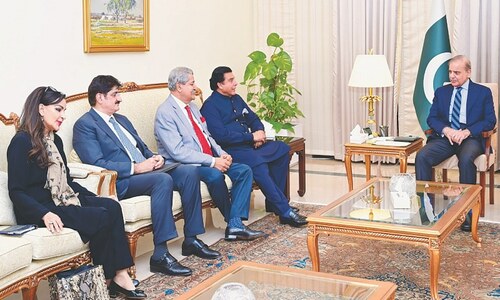WASHINGTON, March 26: US President George W. Bush has waived democracy-related restrictions on Pakistan, allowing the country to receive $300 million of US assistance this year.
A US law forbids funding to countries whose “duly elected head of government is deposed by military coup or decree”.
The law automatically applied to Pakistan when President Pervez Musharraf toppled former prime minister Nawaz Sharif in October 1999. But Pakistan has been receiving annual waivers from the White House since 2002 after it joined the US-led war on terror.
The restriction is included in the budget requests that the US president sends to Congress but is later removed through a waiver if the president believes that removing such restrictions was in US interest.
This will apparently be the last waiver for Pakistan as the country already has an elected government and President Musharraf has retired from the army.
In a memo to the secretary of state, Mr Bush noted that the waiver “will facilitate the transition to democratic rule in Pakistan; and is important to US efforts to respond to, deter, or prevent acts of international terrorism”.
White House spokesman Gordon Johndroe said the Bush administration still had concerns about the human rights situation in Pakistan, where President Pervez Musharraf took power by force in 1999, but stressed its major strategic role.
“Pakistan is a key ally in the war on terror. The Pakistani government is conducting military, police and intelligence operations to fight terrorist groups on Pakistani soil and bring terrorists to justice,” Mr Johndroe said.
The White House said that Mr Bush had asked the US Congress for about $300 million for security assistance in Pakistan.
The announcement came as Prime Minister Yusuf Raza Gilani was sworn in by President Musharraf after being picked as premier by parliament on Monday.
Mr Johndroe stressed that “we continue to have concerns about respect for fundamental civil and political rights in Pakistan”, citing last November’s state of emergency and suspension of the Constitution.
But he said that President Musharraf had “kept his commitments” to retire from the military and be sworn in as a civilian president, and to lift the state of emergency. He also noted that multi-party elections had successfully been held.
“We are currently assessing the impact of those elections on future requirements for waivers of coup-related sanctions,” Mr Johndroe added.














































Dear visitor, the comments section is undergoing an overhaul and will return soon.